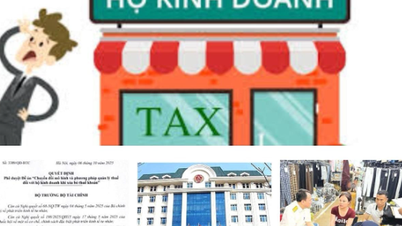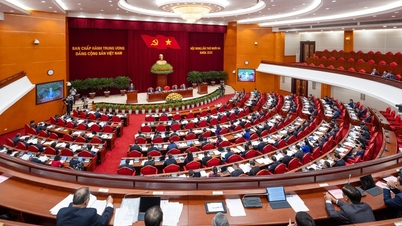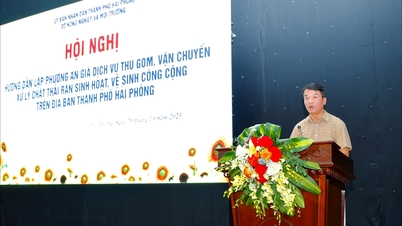
More than 5 million business households will have to switch from lump-sum tax to the method of declaring and paying tax based on actual revenue - Photo: QUANG DINH
Prof. Dr. Hoang Van Cuong - Member of the National Assembly's Economic and Financial Committee - affirmed this when talking to Tuoi Tre about the revised Law on Tax Administration, which is expected to be discussed and approved by the National Assembly at its session next week.
Mr. Cuong said: "Enterprises, households and individuals doing business or in general, business people, when producing and doing business with profit, must be responsible for declaring and fully contributing their obligations. Meanwhile, tax management must contribute to helping people and businesses feel secure in investing in production and business."
Need to transform tax management

Prof. Dr. Hoang Van Cuong
* In your opinion, how should tax management create peace of mind for businesses and people?
- In the past, we had not applied information technology and digital transformation. Business people had to declare and store documents and books, then line up to buy invoices from the tax authorities and make reports to send to the tax authorities. But now, in the era of the 4.0 revolution, everything can be digitized.
In fact, in recent years, tax procedures such as declaration, invoice issuance, tax payment, tax refund... have all been carried out in the electronic environment. Business people no longer need to keep records of input, inventory, sales, import prices, debts... in the traditional way, but data is entered into management software. Typically, large enterprises and corporations, when selling goods to collect money, must issue electronic invoices and connect with tax authorities.
For businesses, tax management may not change much when everything has been digitized. But the method of tax management will change dramatically for business households - an important force in the economy. Resolution 68 of the Politburo on private economic development emphasizes ending lump-sum tax in 2026. Thus, more than 5 million business households will switch from lump-sum tax to declaration tax.
This means that businesses can issue electronic invoices, pay taxes based on actual sales revenue, and use sales software instead of manually recording books as they have done for a long time. When selling a lighter, a pack of noodles, a box of cakes, etc., the seller only needs to put the goods into the cash register. The machine will recognize the item, unit price, quantity, and total amount that the buyer must pay.
The software automatically calculates and prints out a receipt, which is considered an invoice. Information about the order value is also immediately sent to the tax authority. Once the revenue information is available, the system automatically calculates the monthly tax that the business must pay. And so, the business person can focus on production and business without having to worry about declaring and reporting books to the tax authority.
Business households will operate more professionally.
* What benefits do business people, especially business households, get when switching to tax declaration?
- More importantly, digitization and conversion of manual recording to using sales software helps production and business households manage business activities more conveniently and professionally.
All information from imported goods, quantity, unit price to sold goods, incurred costs... are all available on computers, smartphones, no need to record books manually like before. Thanks to that, business people can evaluate business efficiency, expand scale in the direction of development. This is also the goal that we aim for business households to form enterprises.
For the management agency, it is necessary to digitize the entire management process, including tax management. The State will manage taxes in the direction that those who do good business will pay high taxes and vice versa, those who do business at a loss will not have to pay taxes. This creates transparency in tax management.
Once digitized and technology is applied, the tax authority can manage the data system, thereby detecting unusual signs such as entering 10 dong and selling 100 dong, and only need to check these suspicious cases.
This management method will also encourage businesses and people to do business honestly, in accordance with regulations and confidently develop production and business. I would also like to add that although initially implementing digitalization for business households, there were many confusions, and even difficulties when using the software.
But in the long run, revenue as well as tax from selling a pack of toothpicks, a lighter... are also digitized. At the end of the month, from the data on the system, the software automatically calculates the total revenue and the amount of tax that business A must pay in the month. The business does not have to declare or report anything, but only needs to check the information and pay taxes.
With such a simple way of doing things, in my opinion, no business household would think of tax evasion.
* But many businesses are worried that they will have to pay more taxes when switching to declaration tax, sir?
- The goal of switching to a declaratory tax, as I said above, is to help businesses operate more professionally and create a transparent, competitive business environment, not to collect more taxes.
Because taxes are paid based on actual revenue, high revenue, effective business, business people are willing to contribute. The problem is to calculate the appropriate tax rate and taxable revenue threshold to encourage business people to comply.
If the tax rates and tax thresholds are too unreasonable, making people feel forced to pay, they may have to think about tax evasion.
Taxable revenue threshold must be from 1 to 2 billion VND
* In your opinion, what is the appropriate taxable revenue threshold for business households?
- The starting point for the upcoming tax declaration is very important. According to the provisions of the Law on Value Added Tax, from 2026, taxable revenue for business households and individuals is 200 million VND/year, meaning that only those with revenue over 200 million VND must pay tax.
Personally, I think this level is low. Because with personal income tax, taxpayers have income from wages and salaries that are deducted for themselves and their dependents (if any), and only the income above this level must be taxed.
According to current regulations, the deduction for taxpayers is 11 million VND/month and dependents is 4.4 million VND/month. The proposed levels are 15.5 million VND/month and 6.2 million VND/month, respectively. Accordingly, the deduction for a taxpayer with one dependent is 260.4 million VND/year. Only income above this level is subject to tax.
To be fair among taxpayers, for a business household with an income of 260 million VND, the taxable revenue threshold must be much higher, about 1 - 2 billion VND, not 200 million VND as stipulated in the Law on Value Added Tax. Usually, a business household has at least two employees. Therefore, the revenue threshold for a business household must be doubled, ensuring that it encourages business households to do business with peace of mind and is also fair among taxpayers.
In addition, in my opinion, revenue thresholds should be divided by industry and business sector. Because in reality, there are businesses that sell goods, the cost of importing goods is very high, such as a box of powdered milk, a crate of beer is several hundred thousand VND but the profit when sold is only 15,000 - 20,000 VND. The profit ratio on revenue is very low, mainly taking labor as profit.
Meanwhile, for service providers such as haircutting, shampooing... the input costs are not as high as selling goods, so the income can be 30-40%, even 50% of revenue. Therefore, it is necessary to divide the revenue threshold by industry as well as have appropriate tax rates.
Tax administration will change dramatically.
According to Mr. Hoang Van Cuong, the goal set by Resolution 68 of the Politburo on private economic development is that by 2030 the whole country will have at least 2 million enterprises and 3 million enterprises operating by 2045.
Thus, the method of state management in general, and tax management in particular, must promote digital transformation and the entrepreneurial spirit of businesses and people. Accordingly, first of all, tax must be a tool to regulate business behavior, and incentives must apply preferential tax rates, even tax exemptions.
On the contrary, any behavior, goods, or services that need to be restricted will be subject to high tax rates. And the second goal of tax is to generate revenue for the budget.

Many experts believe that the taxable revenue threshold should be raised to 1 - 2 billion VND/year to be appropriate - Photo: QUANG DINH
The minimum family deduction must be 17 million VND/month.
* At the National Assembly session that will open this month, the draft revised Law on Personal Income Tax will be discussed and approved. In your opinion, should the family deduction level be increased to reduce losses for taxpayers?
- In principle, the family deduction must ensure that taxpayers pay the most essential expenses such as food, housing, clothing, transportation, education, etc., that is, they must be enough to live on. In fact, over the past 5 years, the consumer price index has increased by about 20%, along with a significant increase in the average income of workers.
Therefore, the family deduction for taxpayers must be raised to at least 1.5 times the current regulation of 11 million VND/month. So somewhere the deduction is 16.5 - 17 million VND/month. This is the minimum, the higher the better.
And the same goes for the deduction for dependents. From 2020 to now, the regulation of 4.4 million VND/month to support a school-age child is not enough, it needs to be increased 1.5 - 2 times, to 7 - 9 million VND/month. Because dependents are mainly children of school age. So in addition to the usual food expenses, a child needs to learn foreign languages, talents, life skills, etc. This is an investment for the future, for the country's high-quality human resources, so the policy should not be too fundamental.
When the minimum living conditions are guaranteed, taxpayers will expand their investment, production and business, and if they are profitable, they will return to contribute more to the budget. Therefore, to create a sustainable source of revenue, tax policies and tax management methods need to nurture revenue sources and encourage the entrepreneurial spirit of businesses and people.
Source: https://tuoitre.vn/thue-phai-thuc-day-tinh-than-kinh-doanh-20251016074633063.htm



![[Photo] Nhan Dan Newspaper launches “Fatherland in the Heart: The Concert Film”](https://vphoto.vietnam.vn/thumb/1200x675/vietnam/resource/IMAGE/2025/10/16/1760622132545_thiet-ke-chua-co-ten-36-png.webp)



![[Photo] General Secretary To Lam attends the 18th Hanoi Party Congress, term 2025-2030](https://vphoto.vietnam.vn/thumb/1200x675/vietnam/resource/IMAGE/2025/10/16/1760581023342_cover-0367-jpg.webp)



































![[Video] TripAdvisor honors many famous attractions of Ninh Binh](https://vphoto.vietnam.vn/thumb/402x226/vietnam/resource/IMAGE/2025/10/16/1760574721908_vinh-danh-ninh-binh-7368-jpg.webp)

































































Comment (0)